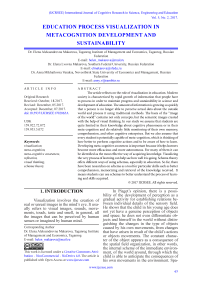Education process visualization in metacognition development and sustainability
Автор: Elena Aleksandrovna Makarova, Elena Lvovna Makarova, Anna Mikhailovna Varaksa
Журнал: International Journal of Cognitive Research in Science, Engineering and Education @ijcrsee
Рубрика: Original research
Статья в выпуске: 2 vol.5, 2017 года.
Бесплатный доступ
The article reflects on the role of visualization in education. Modern society is characterized by rapid growth of information that people have to process in order to maintain progress and sustainability in science and development of education. The amount of information is growing so quickly that a person is no longer able to perceive actual data about the outside world and process it using traditional methods. The basis of the “image of the world” contains not only concepts, but the semantic images created with the help of visual thinking. In our study we assume that students are quite limited in their knowledge about cognitive phenomena or in their meta-cognition and do relatively little monitoring of their own memory, comprehension, and other cognitive enterprises. But we also assume that every student is potentially capable of meta-cognition, which is thinking of how better to perform cognitive actions and to be aware of how to learn. Developing meta-cognitive awareness is important because it helps learners become more efficacious and more autonomous. For many of them it can be identified as the most effective way of acquiring knowledge. Visualizing the very process of learning can help see how well it is going. Schema theory offers different ways of using schemas, especially in education. So far, there have been researches on schema as a tool for particular skills such as better comprehension, memorizing and retrieval of the knowledge received. It means students can use schemas to better understand the process of learning and skills acquired.
Visualization, metacognition, metacognitive awareness, reflection, visual thinking, schema theory
Короткий адрес: https://sciup.org/170198507
IDR: 170198507 | УДК: 159.922.72.072 | DOI: 10.5937/IJCRSEE1702065A


